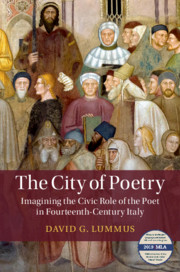Refine search
Actions for selected content:
9 results
Chapter 12 - The Vision of Judgment and the Visions of ‘Author’
-
-
- Book:
- The Cambridge Companion to Byron
- Published online:
- 02 November 2023
- Print publication:
- 16 November 2023, pp 193-208
-
- Chapter
- Export citation
Chapter 36 - Monarchy, Royalty, and Arts Patronage
- from Part V - British Sociocultural, Religious, and Political Life
-
-
- Book:
- Benjamin Britten in Context
- Published online:
- 31 March 2022
- Print publication:
- 21 April 2022, pp 319-326
-
- Chapter
- Export citation
Chapter 3 - Francesco Petrarch, Poet beyond the City
-
- Book:
- The City of Poetry
- Published online:
- 03 December 2020
- Print publication:
- 17 December 2020, pp 112-155
-
- Chapter
- Export citation
Chapter 2 - Dante Alighieri, Poet without a City
-
- Book:
- The City of Poetry
- Published online:
- 03 December 2020
- Print publication:
- 17 December 2020, pp 63-111
-
- Chapter
- Export citation
Introduction
-
- Book:
- The City of Poetry
- Published online:
- 03 December 2020
- Print publication:
- 17 December 2020, pp 1-21
-
- Chapter
- Export citation
Chapter 1 - Albertino Mussato, Poet of the City
-
- Book:
- The City of Poetry
- Published online:
- 03 December 2020
- Print publication:
- 17 December 2020, pp 22-62
-
- Chapter
- Export citation

The City of Poetry
- Imagining the Civic Role of the Poet in Fourteenth-Century Italy
-
- Published online:
- 03 December 2020
- Print publication:
- 17 December 2020
Part VI - Chaucer Traditions
-
- Book:
- Geoffrey Chaucer in Context
- Published online:
- 24 June 2019
- Print publication:
- 11 July 2019, pp 401-444
-
- Chapter
- Export citation
Chapter 48 - The First Chaucerians
- from Part VI - Chaucer Traditions
-
-
- Book:
- Geoffrey Chaucer in Context
- Published online:
- 24 June 2019
- Print publication:
- 11 July 2019, pp 403-409
-
- Chapter
- Export citation
